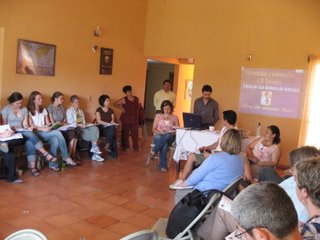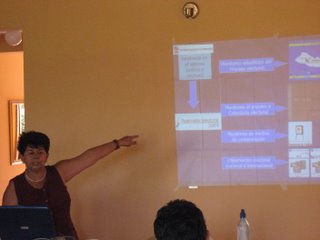
Today we are receiving our electoral training at the
Iniciativa Social para la Democracia (ISD, Social Initiative for Democracy).
 Ramon Villalta, Executive Director
Ramon Villalta, Executive DirectorAfter 37 years, real chance or change in power.
1972: important triumph that was overthrown in that person who was elected was not allowed to take power. If he were allowed to take power, situation today would have been different. High spending, lack of ethnics & morals. Important that outcome of Sunday’s elections be respected, regardless of which candidate wins. Seen messages from Arena & groups of businessmen close to them that they will not turn over power if they lose. Dangerous message, because they are opposed to change in power. For that reason, national and international observation is important because it contributes to transparency and elements we need to dissuade fraud. Our primary job is to dissuade and prevent fraud, and our presence alone in electoral centers will contribute to that. Part of 800 national and international observers. Will be in 60 municipalities in 12 municipalities in the country. Our observations will allow us to monitor events on a national level. This will be translated into a final report on observations, not only on election day but from August 2007 until Sunday. For this reason, your contribution is important. We are together in a battle to achieve this goal.
 Maricela Fernandez
Maricela FernandezFormed after peace accords. 16 yrs on civic engagement and building democracy. We also work on other themes, that sometimes don't look like democracy if we see it as only elections. Also work in civic participation, electoral political process since first elections in 1994 after peace accords. Also work to strengthen institutional proposals. Also work in collaboration with others. We can't observe just day of election, but process leading up to it and results afterwards. Elections not won or lost on 15th, but in terms of what leads up to it. Monitoring on a daily basis what is happening. Watch calendar since August 2007, and there is endless abuses. This morning 2 illegal interviews on TV by both Arena & FMLN since campaigns were to end last nite at midnite. Also monitoring the press for the first time this year, because for the first time victory will largely be attributed to press because they are the ones who communicate messages. Monitoring to see what kind of messages they transmit. The last aspect is observation, which is what we're working on today.
Only 2 parties in 2009. Originally more, but they pulled out. When there are more than 2 parties, unless someone wins more than 50% there is a second round. But because there are only 2 parties, a second round would be redundant. Originally 4 (Arena, FMLN, PCN, PDC), but both pulled out. PCN led by evangelical leader who excited his base, and when party pulled his candidacy the leader felt shamed. Interesting phenomena, because they promised support for Arena but the members want to support FMLN which leads to a split into factions because it made this decision without consulting anyone.
Principle problems of 2009 electoral process:
1. Inconsistencies in constitution.
2. Campaign started early, began when current president took power.
3. No approval for electoral reforms.
4. Arena's control over TSE, majority vote & president votes 2x. FMLN tries to get copy of electoral registry, but TSE won't give it to them. Has 11 key fields including address and phone number, even though Arena has that info, including access to private telephone numbers. Also have access to work places, and telling people that if they don't vote for Arena they will lose their job. Being told that they need to take a picture of their ballot for Arena or will lose their job.
5. Use of state resources
6. Lack o residential voting programs.
7. Lack of equal resources because of no finance control (Arena has much more resources than FMLN).
8. Pressure on government officials to be part of voting table (JRV) whose votes are visible to everyone else, and if they voted for the FMLN their jobs are in danger. When there were more parties it would be difficult to have a tie, but now with 2 from each party how are they going to achieve agreement? Tables set up for confrontation.
9. Voting at private businesses
A lot of polls, some credible some not. But looking over polls and attitudes toward transparency, 46% think will be clean, 44% believes there will be fraud (because they have seen or experienced something). 85% interested in voting. Important because it shows the level of interest. 92.4% plan to participate. Anther element to take into account is voter intentions with polls showing tendency to Funes. Important to watch, because if so many people plan to vote but if because of fraud or violence it turns out differently it will be significant.
 Ivan Callejas
Ivan CallejasRules for observation. Residential voting. Define electoral observation: allowed, but limited to this. Guidelines:
1. Recognize and respect sovereignty of Salvadoran state.
2. No interference in the electoral process. Can't suggest or propose something. But can't judge situation. But use our tools: take the manual, wear t-shirt, bring cameras, recorders, videos. We can go to JRV and tell them that they are doing something wrong. With a telephone, we can report a problem to an emergency number or coordinator. Usually not problems. Passive role. Nothing that says that we are or are not allowed to use cameras or recording equipment, but it is the most useful tool to document problems. Our strength of character will define us on that day. We can denounce problems to coordinator, but it leaves it up to them to do something.
3. Impartial
4. Neutral
5. Objective, rigorous, and discretion. Stay objective and take notes, but don't be mislead. Be rigorous. Denounce errors from either side.
Types of observers:
1. Official international observers invited by TSE or Salvadoran government.
2. Visiting international observers, asked by TSE or asked TSE to participate.
3. Observers invited by political parties, inc. national observers.
Rights and services:
1. credential to enter into voting center w/o problems to carry out functions as observers.
2. observe all phases of process
3. access to political parties
4. access to results
5. access to voting centers and Juntas Receptores de Votos (JRV)
6. receive denouncements and complaints (write them down and give to proper authorities)
Responsibilities of observers:
1. Respect Salvadoran constitution
2. wear credentials
3. no campaigning or promotion of a candidate
4. don't act in manner counter to role in terms of behavior. Limits what we do, but that does not mean that we will not play a protagonistic role.
5. Present to TSE any anomaly.
6. Do not interfere in activities of table. Observe at a prudent distance, so we can see what is happening but not to put pressure or insert ourselves in process.
7. Not to celebrate winning of a party or to offer projections of results before TSE has announced results. At points information emerges about who is winning, but we have to abstain from showing emotions.
8. Maintain objectivity and professionalism when results are shown, and abstain from conflicts. Observe, not participate. "Gritar en silencio." Our role is important, because of accusations of Chavez financing the FMLN, etc. As an observer, we can't show anything that would associate us with the FMLN. Doing that would give weapons to the right to delegitimize international observers. What we are asking is not easy, but it is important.
9. Prepare report at end.
Maricela FernandezObserve electoral event (not process) on March 15:
1. Installation of JRV.
a. open at 5am. Have to be there then, and will close doors because afterwards they will not let you in. But need to be there before, because that is when people will be interacting and characters of actors will be shown.
b. Open package with everything and instructions. 2 representatives from each party. TSE decided that each JRV w/ odd number will have a president of FMLN and secretary of Arena (and even reverse). Already decided—shouldn't be a discussion.
c. review materials, to be sure that ballot numbers are in sequence (450 ballots in each place)
d. check to make sure each ballot is printed front & back.
e. put materials on table.
f. post electoral registry; this is important, so people can see it. Physical condition of voting center may determine this, but it is used as an excuse not to let people vote.
g. Fill out installation act.
f. Those working table then vote (JRV, party workers, TSE), but observers can't vote in place where they are observing.
2. voting: 4 people: secretary, president, segundo vocal, primer vocal (if even numbered table, president and primer vocal will be Arena). For the first time, curtain to protect privacy of vote. Need to look for:
* visible number of JRV so people can find it
* voting registry posted
* voting booth in place where people can't see votes
Party's have electoral registry and help people find voting place, but also take advantage of time to tell them how to vote, which is a violation of electoral rules. As observers, don't help people. Don't cross the line. Needs to be absolute line between observers and those representing political parties.
Process:
1. present DUI to president who looks for it in the registry, and stamps next to name. Could be problem of double DUIs--someone with same name? Process of years of creating fake IDs for people to come vote, and giving to people in Guatemala, Honduras, Nicaragua. Paying people to say they have more kids then they have to get fake birth certificates. Don't have absentee ballots because for many people outside of country their names have already been used to create fake IDs.
2. secretary signs & stamps ballot.
3. Shows reverse to everyone
4. citizen votes.
5. Primer vocal verifies that voter signs vote and sticks finger in ink.
6. return DUI
Legally, nothing that allows or prevents someone from taking a picture of a vote. People at table can ask if they want to leave their cell phone, and if they don't they have something to hide they will leave it. Allows political observers to watch who has something to hide. Businesses giving cell phones to workers.
Should be sure that finger is cleaned before dipping in ink so that it cannot be cleaned off.
Vote buying, with pre-marked ballots & bring blank ballot back. Importance of verifying signatures and stamps on back to prevent this. Also important to observe things going on outside voting center, watch what is happening.
Note any problems. Our weapon is our pens; don't intervene, even if it is another observer doing something unethical.
In voting center, we can't approach people & talk to them, but we can do so outside of the voting center.
3. Closing & counting of votes
Closes at 5pm as long as no one is still in line.
Closing documents have always been complicated, with forms not filled out property. Write out words for numbers so they can't be changed easily (like a 6 to an 8).
4 key times for observing:
5-9am: opening of booth
2-4pm: when tendencies become clear
5-6pm: closing
5:30-7pm: vote counting. Should be done by 7pm, because there are only 2 contenders.
Ivan CallejasForms for electoral observation (p. 28). Check corresponding boxes, 21 questions. Note details on sheet apart from this.
Nothing to keep electoral observers from interacting with each other.
Some JRV will try to get observers to leave, but that is where our strength of character is important.

